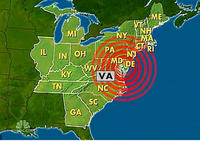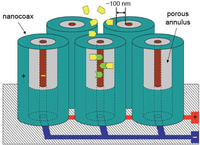-
The historical and future probabilities of 9/11-size terrorist events
On the eleventh anniversary of the 9/11 attacks, two statisticians apply statistical methods to try and accurately estimate the probability of a 9/11-size terrorist attack occurring during the next decade; examining the historical data from 1968 to 2007, they show that the likelihood of a 9/11-size attack occurring within this time frame was between 11 and 35 percent; looking forward, the likelihood increase to between 25 and 50 percent – and, under certain circumstances, to 95 percent
-
-
Questions raised about cost, reliability of BioWatch upgrade

One year ago, DHS said a new contract for Biowatch, a system for detecting biological attacks on the United States, would be awarded in May 2012 and would cost an estimated $3.1 billion during its initial five years of operation; now DHS has decided to postpone the plans due to concerns about cost and reliability
-
-
DHS funds more tests of autonomous power buoy for ocean surveillance

Ocean Power Technologies (OPT) has entered into an agreement with DHS Science & Technology Directorate to perform a new round of in-ocean tests on the company’s Autonomous PowerBuoy to demonstrate its use for ocean surveillance
-
-
Assassination attempt on Quebec’s premier-elect foiled
A man shouting “The Anglos are waking up” broke into a victory party held by Pauline Marois, Quebec’s premier-elect and the leader of the separatist Parti Quebecois (PQ), after the party won the provincial election on Tuesday; the gunman missed Marois but killed one man and wounded two others; the PQ emerged as the largest party in the province, but it failed to win an outright majority; its minority government status means that it will not be able to push for a referendum on Quebec’s independence from Canada
-
-
The costs, benefits, and efficiency of aviation security measures
The threat of terrorist attack on American aviation has made the system the focus of intense security efforts, but it is difficult to determine if the benefits outweigh their cost; efficient security policy — a focus on getting the most security for the least cost — should be the priority in an era of fiscal austerity, says a new RAND report
-
-
Last year’s east coast earthquake has the region preparing for another one

Last year an earthquake that was centered in Virginia shook up the entire east coast, surprising everyone; it did not result in any deaths and was considered relatively light compared to many tremors on the West Coast, but it was bad enough to force some states to prepare themselves in case of another quake
-
-
Photographers and security personnel fight over access to buildings
In the years after 9/11 and the 7 July 2005 London bombings, photographers have been waging a war with security personnel of public and private buildings; photographers argue that anything that one can see from the street can be photographed, even if it is a privately owned building, but security people – both private and the police – are worried about terrorists gathering information for a possible attack
-
-
Campaign against terrorist financial networks complicated, demanding
The U.S. Attorney for the Southern District of New York and the Drug Enforcement Administration (DEA) last week announced the seizure of $150 million in cash from “entities linked to Hizballah,” including the now-defunct Lebanese Canadian Bank (LCB); the announcement may seem like a big win in the war on terror, but it is merely a small dent as terrorist organizations use a myriad of tactics to move their money around undetected
-
-
DHS using Boston subway system to test new sensors for biological agents

Bioterrorism is nothing new, and although medicines have made the world a safer place against a myriad of old scourges both natural and manmade, it still remains all too easy today to uncork a dangerous cloud of germs; DHS’s Science and Technology Directorate (DHS S&T) has scheduled a series of tests in the Boston subways to measure the real-world performance of new sensors recently developed to detect biological agents
-
-
NYPD monitoring of Muslim communities did not produce a single terrorist lead

An NYPDunit which gathers information on Muslim communities and businesses in order to uncover links to terrorist plots has been unable to do so in six years of engaging in monitoring Muslim communities in New York and New Jersey
-
-
Y-12 and operator error
Three anti-nuclear activists, led by an 82-year old nun, breached the perimeter security system of the supposedly highly secure Y-2 nuclear facility at Oak Ridge, Tennessee, where nuclear weapons components are manufactured (note that the Oak Ridge National Laboratory [ONRL] is not affiliated with the Y-12 National Security Complex); they then spent several hours in a secure area of the facility, leisurely spray-painting slogans on the facility’s walls – without the facility’s security staff, or the sophisticated $500 million security cameras and sensors, detecting them; to understand what happened at Y-2, we must accept that operator error is an essential problem in national security, and that the problem is pervasive and normal; the only way to deal with the operator error phenomenon is to build redundancies into the system
-
-
Border Patrol kiosk detects liars trying to enter U.S.

The U.S. Customs and Border Protection (CBP) is using border crossing stations in Arizona to test new technology to detect liars as they attempt to enter the country; travelers are subjected to a 5-minute interview with the kiosk, while microphones monitor vocal pitch frequency and quality, an infrared camera monitors eye movement and pupil dilation, and a high definition camera monitors facial expression
-
-
New device dismantles pipe bombs safely, preserving forensic evidence
Thousands of pipe bombs are made each year, and thousands of pipe bomb threats are called into local police and FBI authorities across the country; many are false alarms, but those that are not can be deadly; dismantling a pipe bomb is tricky and serious business, and missteps during the dismantling process can produce catastrophic results
-
-
Veteran diplomat Brahimi replaces Anan as UN envoy to Syria
The UN Security Council last Thursday decided to end to UN observers mission to Syria, and replace the Kofi Annan, who resigned as UN envoy to Syria two weeks ago, with veteran Algerian diplomat Lakhdar Brahhimi; Annan’s efforts at mediation were equally pointless. The reason: both sides believed they would eventually prevail, and thus had no incentive to negotiate or compromise
-
-
The worse, the better: Assad’s troubles may hasten Hezbollah’s take-over of Lebanon
Lebanon is divided into two: the south and east of the country where Hezbollah is the sole ruler, and the rest of the country, which is under the nominal control of the central government – in which Hezbollah is the main actor; the weakening of the Assad regime in Syria has emboldened Hezbollah’s Lebanese opponents to renew their demands that Hezbollah disarm; with the Assad regime’s continuing problems, Hezbollah’s position will become only more difficult; in response, the organization may try to use its still-considerable military capabilities for a provocation against Israel, and attacks on its political opponents at home, or both, exploiting the ensuing turmoil to complete its take-over of Lebanon
-
More headlines
The long view
How Male Grievance Fuels Radicalization and Extremist Violence
Social extremism is evolving in reach and form. While traditional racial supremacy ideologies remain, contemporary movements are now often fueled by something more personal and emotionally resonant: male grievance.
